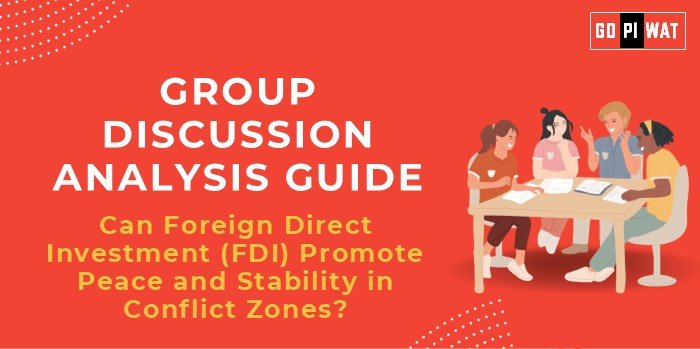📋 Group Discussion Analysis Guide
🌍 Can Foreign Direct Investment (FDI) Promote Peace and Stability in Conflict Zones?
💡 Introduction to the Topic
🌱 Opening Context: Foreign Direct Investment (FDI) has historically been viewed as a vehicle for economic growth and development. In conflict zones, it holds the potential to transform economies, stabilize regions, and foster peace by creating jobs and reducing poverty.
📜 Topic Background: The intersection of FDI and conflict stabilization is a relatively novel but critical area of international relations. The theory suggests that FDI can deter violence by promoting economic interdependence and providing incentives for peace. Examples such as post-conflict reconstruction in the Balkans and Sierra Leone illustrate the potential, yet questions about feasibility and ethical considerations remain.
📊 Quick Facts and Key Statistics
- 💵 Global FDI Inflows: $1.3 trillion in 2023, with less than 5% targeting fragile and conflict-affected areas (UNCTAD, 2023).
- 👷 Job Creation: Every $1 billion in FDI can create approximately 20,000 direct and indirect jobs (OECD, 2023).
- 📉 Conflict Costs: Armed conflict reduces a nation’s GDP growth by an average of 3-5% annually (World Bank, 2022).
- 🌍 Reconstruction Examples: Bosnia and Herzegovina’s GDP grew by 40% from 1996-2000 due to post-war FDI.
🌍 Stakeholders and Their Roles
- 🏛️ Governments: Facilitate policy frameworks, ensure security, and attract FDI through stability guarantees.
- 🏢 Private Corporations: Invest in conflict zones for potential high returns, contributing to economic development.
- 🌐 International Organizations: Provide oversight, funding guarantees, and peacekeeping.
- 👥 Local Communities: Benefit through employment and infrastructure but may resist if initiatives disregard cultural contexts.
🏆 Achievements and Challenges
🌟 Achievements:
- ✔️ Economic Revival: FDI contributed to Mozambique’s growth post-civil war by bolstering the mining and agriculture sectors.
- 🛣️ Infrastructure Development: In Afghanistan, FDI has supported road construction and telecommunications.
- 🤝 Peace Incentives: Economic interdependence reduced tensions between Israel and Palestine during periods of sustained FDI.
⚠️ Challenges:
- 🔒 Security Risks: Investors often face threats to personnel and assets in unstable regions.
- ⚖️ Ethical Concerns: Accusations of exploitation, such as in diamond mining in Sierra Leone.
- ⚙️ Political Instability: Fragile governments may misuse FDI for corrupt practices.
🌍 Global Comparisons:
- ✅ Success: Post-apartheid South Africa utilized FDI to modernize infrastructure and reduce unemployment.
- ❌ Challenges: Yemen continues to struggle with attracting FDI amidst ongoing violence.
📜 Case Studies:
- 🇧🇦 Bosnia and Herzegovina: International investment in manufacturing and tourism promoted stability post-conflict.
✨ Structured Arguments for Discussion
- 💬 Supporting Stance: “FDI provides economic opportunities, reducing incentives for conflict and enabling long-term stability.”
- ⚖️ Opposing Stance: “Without robust governance, FDI in conflict zones often exacerbates inequality and corruption.”
- 🔄 Balanced Perspective: “While FDI has potential, its success depends on accompanying measures like governance reforms and community engagement.”
🎯 Effective Discussion Approaches
📖 Opening Approaches:
- 📊 “FDI can transform conflict zones by fostering economic interdependence, as seen in post-war Sierra Leone.”
- 📜 “While promising, FDI in conflict zones raises ethical questions about exploitation and inequality.”
🔄 Counter-Argument Handling:
- ✔️ Example: “The exploitation in Sierra Leone highlights the need for international regulation of FDI in conflict zones.”
- 💡 Solution: “Implementing transparency frameworks ensures fair distribution of benefits.”
📈 Strategic Analysis of Strengths and Weaknesses
- 💪 Strengths: Economic growth, infrastructure, job creation.
- ⚠️ Weaknesses: Security concerns, governance issues.
- 💡 Opportunities: Promote peace through interdependence, attract international cooperation.
- 🚨 Threats: Political instability, exploitation risks.
📚 Connecting with B-School Applications
- 🌟 Real-World Applications: Projects on sustainable investments in fragile regions.
- 💬 Sample Interview Questions:
- “What are the risks and rewards of investing in conflict zones?”
- “Can businesses play a role in fostering peace? Discuss with examples.”
- 📖 Insights for B-School Students:
- Understand FDI as a tool for peacebuilding.
- Learn to balance profitability with ethical responsibilities in fragile settings.


